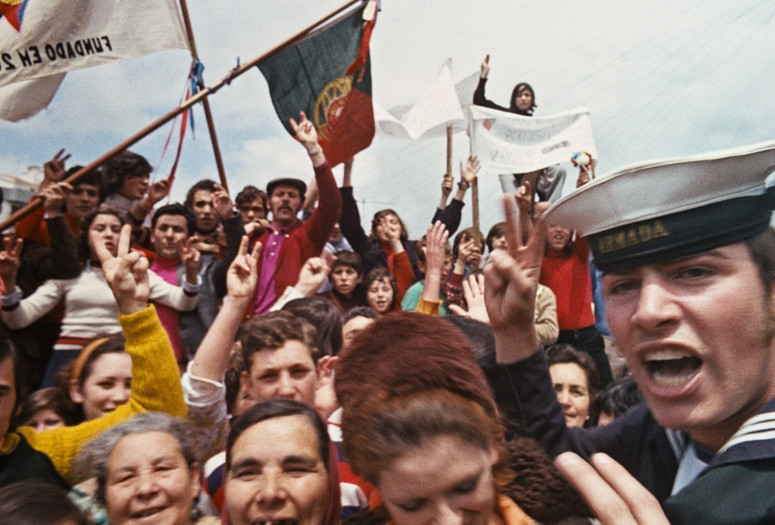By the mid-1970s, Robert Kramer had run out of revolutions. In 1969 alone he had shot Ice in New York City, his fiction-vérité call to arms, and People’s War with Newsreel comrades in North Vietnam, supporting communist-led nationalism against U.S. imperialism. He moved to Vermont and formed a radical commune that stockpiled guns, but when insurrection failed to occur, it took him another half-decade to complete Milestones (1975, co-directed with John Douglas), an elegy for the Movement.
Then for a moment in 1975, Portugal gave him hope. Scenes from the Class Struggle in Portugal (1977) documents that initial euphoria, which eventually migrates downward from heady rush to sour stomach as the screws tighten and old structures of power reassert themselves in new forms. A messy, jumbled film, and a work of outsiders among the mostly national filmmakers of the Museum of Modern Art’s “Ongoing Revolution of Portuguese Cinema” series, Scenes viscerally captures a crucial inflection point in Kramer’s career, as he went to record the extension of the ‘60s liberation dream and instead returned with a chilling view of the emerging neoliberal world order that only intensified throughout the financial neocolonialism of the 1980s.
It was Milestones’s screening at the Cannes Film Festival in 1975 that took Kramer to Portugal for another film festival appearance, and he pounced at the opportunity to witness the ongoing Carnation Revolution. António de Oliveira Salazar had presided over the longest fascist regime of the century, but after bleeding Portugal dry in his strident defense against anticolonial movements in Angola, Mozambique, and Guinea-Bissau, he was deposed by military leaders. Military coups rarely come from the left, but Kramer’s visit coincided with the presiding Armed Forces Movement’s endorsement of “popular power,” a somewhat nebulous framework premised on radical grassroots democracy. Cannes ended in May, and by July, Robert and his collaborator Philip Spinelli were back and filming, with no real budget, script, or crew, and using borrowed cameras (Spinelli estimated their total budget at around $12,000).
Kramer and Spinelli shot agricultural land occupations, women-led labor revolts, reclamations of empty housing stock, and even the impoverished residents of rural northern Proença-a-Nova who were challenging the Catholic church’s indoctrination of their children. Much of this feels like a Newsreel short from six years earlier, except in the nicely vivid color of this new restoration (a whole new film for anyone familiar with the washed-out version that circulated online for years). But before long, Kramer and Spinelli capture Portugal’s creeping repression, as successive governments in the wildly unstable nation scale back commitment to popular power; what initially appeared radical begins to look more like preparation for integration into western European capitalism.
Scenes skewers Portuguese communists and socialists for their complicity in that rightward shift. Some of this can be attributed to Kramer’s sectarian attachment to the extremist Proletarian Revolutionary Party, basically Portugal’s live version of Ice’s fictional vanguard cadre, but the film nonetheless presents compellingly damning analysis (its political line was further complicated because it was edited under the watchful eyes of both the Weather Underground and its bitterly opposed offshoot, the Prairie Fire Organizing Committee).
Many Portuguese leftists, such as legendary arthouse producer Paulo Branco, found Scenes somewhat simplified and romantic, very much the work of Americans. They’re probably right, but its footage has a life of its own. Taken on auteurist terms, Spinelli deserves credit—of the duo, only he spoke Portuguese, and he’s a fascinating figure who was active in the early-70s Vermont gay liberation, served in the crew and cast of Milestones, and later produced the good 1983 b-movie Eyes of Fire and a few very bad ones too. Still, most will approach Scenes as a Kramer film, and it’s arguably his final revolutionary work. He too would soon be swept into the currents of the European Eighties, in complicated but productive ways, but for one last time, democracy was in the streets.
Scenes from the Class Struggle in Portugal screens this afternoon, November 4, at the Museum of Modern Art as part of the series “The Ongoing Revolution of Portuguese Cinema.”



